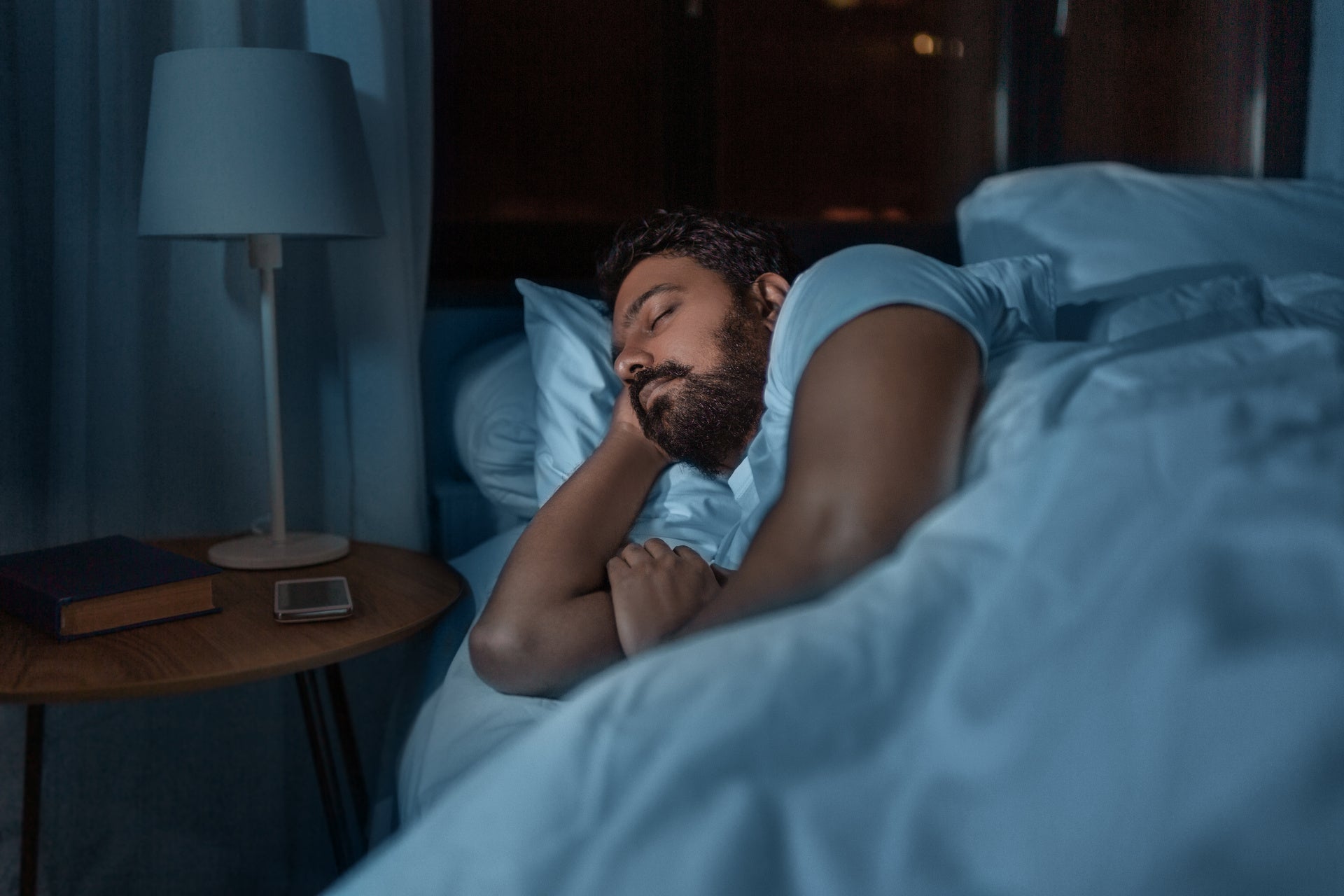Struggling to get a good night's sleep? You're not alone. Many adults find it hard to wind down after a long and often stressful day, especially when the sun sets later, as it does during the summertime.
But with the right adult bedtime routine, you can improve your sleep quality and start waking up feeling refreshed. Let's explore some effective strategies for creating an adult bedtime routine that works for you and helps you (finally) achieve healthy sleep.

Why Adult Bedtime Routines Matter
A consistent adult bedtime routine helps signal to your body that it’s time to wind down. That makes it easier to fall asleep and improves sleep quality.
While often emphasized for kids, this practice is just as important for adults and plays a key role in supporting overall health and well-being.
Research shows that adults with regular bedtime habits and routine sleep hygiene tend to sleep more soundly and feel more refreshed, energetic, and ambitious during the day. Establishing a predictable daily rhythm prepares both the mind and body for rest, promoting better sleep hygiene.
When your body expects sleep, it naturally increases melatonin production, helping regulate your internal clock (circadian rhythm).
Keeping this rhythm stable shortens the time it takes to fall asleep, and reduces nighttime awakenings—leading to deeper, more restorative rest.
Key Elements of an Effective Adult Bedtime Routine
Building an effective nighttime routine involves several components working together. Each element plays a part in signaling to your body that it's time to wind down. Consider these aspects for your own sleep care plan.

Set a Consistent Sleep Schedule
Try to go to bed and wake up at the same time every day—even on weekends. This consistency strengthens your body’s natural sleep-wake cycle, making it easier to fall asleep, wake up naturally, and get more restful sleep overall.
According to the National Sleep Foundation, adults with regular sleep schedules report better sleep quality and greater daytime alertness.
Staying on schedule—even during weekends—helps keep your biological rhythms in sync and prevents "social jetlag," a mismatch between your internal clock and actual sleep times that can throw off your rest.
Aim for as much consistency as you can. Even small adjustments toward a regular routine can improve your sleep. Over time, your body will begin to feel naturally tired at bedtime, making sleep come more easily.
Create a Relaxing Environment
Your bedroom should be a calm, restful space that supports sleep. Keep it cool, quiet, dark, and clutter-free to create an ideal environment. Invest in comfortable bedding and pillows to enhance relaxation and support.
If outside light seeps in, try blackout curtains, an eye mask, or room-darkening shades—especially useful during long summer evenings. These tools help block light pollution and create a cave-like setting that signals your brain it’s time to rest.
The ideal sleep temperature is typically between 60–67°F (15–19°C), but you may need to experiment to find what feels best for you.
When it comes to sound, silence works for some, while others sleep better with white or pink noise, or calming sounds like rain or ocean waves to drown out disturbances.
Just know that on nights like the Fourth of July or New Year’s Eve, even the best sleep setup might need a little patience.
Dim the Lights
As evening approaches, start lowering the lights in your home. This gradual reduction in light exposure signals to your brain that it's time to wind down.
Bright lights, especially those with a blue tint such as screens, can suppress melatonin, the hormone that regulates sleep and signals it's time to sleep. Consider blue light blocking glasses if you're watching a game, TV show, or a movie.
Use warm, dim lighting in the hours leading up to bedtime. Salt lamps or red-tinted bulbs are good options as they have less impact on melatonin levels than bright, cool-toned lights.
This simple change can make a noticeable difference in how quickly you feel tired.
Think of it as mimicking natural sunset, as it helps your body prepare for sleep.

Limit Screen Time
The blue light from phones, tablets, TVs, and computers can disrupt your sleep cycle by delaying melatonin production, making it harder to fall asleep. To support better rest, avoid electronic devices for at least an hour—ideally two—before bedtime.
If screen use is necessary, switch on "night mode" or wear blue light blocking glasses to minimize the impact.
Instead of scrolling social media, which can be over-stimulating and keep you staring at a screen longer than planned, choose a calming activity. Read a physical book, listen to soothing music, or play a relaxing podcast to help your brain wind down.
Blue light mimics daylight, tricking your brain into staying alert. Cutting back on screen time in the evening is a powerful step toward falling asleep faster and improving sleep quality.
Practice Relaxation Techniques
Incorporating stress-reducing activities into your adult bedtime routine can make a big difference in how easily you fall asleep.
Gentle practices like meditation, deep breathing, light stretching, and yoga help calm the mind and relax the body, setting the stage for better sleep.
Apps such as Calm or Headspace offer guided meditations tailored for bedtime relaxation. Even a few minutes of mindful breathing can ease anxiety and lower stress levels.
Over time, a consistent meditation practice can improve both your ability to fall asleep and overall sleep quality.
Adding techniques like progressive muscle relaxation—tensing and releasing each muscle group—can further reduce physical tension. Gentle yoga poses, such as child’s pose or legs-up-the-wall, are soothing additions to any adult bedtime routine.
Just 10 minutes of these calming activities each night can help you unwind and fall asleep more easily.
Take a Warm Bath or Shower
A warm bath or shower an hour or two before bedtime can help you relax and fall asleep faster.
The magic happens afterwards... the drop in body temperature later mimics the natural decrease in core body temperature that occurs as you prepare to fall asleep. This dip signals to your body that it's time for rest.
Add some lavender essential oil to your bath for extra relaxation benefits, as studies suggest it can improve sleep quality. Epsom salts can also aid muscle relaxation. The key is to make this a calming ritual, not a rushed task.
This body temperature change is a powerful sleep cue. Ensure that the water's warm, not scalding hot. Excessively hot water can be overly stimulating for some people. The goal is to feel relaxed and comfortable.

Write in a Journal
The practice of bedtime writing or journaling can help clear your mind of its racing thoughts, reduce anxiety, and express gratitude. Write about your day, your worries, things you're grateful for, or even create a to-do list for the next day to get those thoughts out of your head.
Keep a gratitude journal, where you list things you're thankful for. That's been linked to better sleep, according to research published in the Journal of Psychosomatic Research.
This focuses your mind on positive thoughts before sleep, which can be helpful for those who experience stress or worry keeping them awake at night.
Just 10-15 minutes of bedtime journaling can make a big difference. It helps you process emotions and thoughts, and prevents them from swirling around your head when you're supposed to be sleeping.
Daytime Habits That Support a Good Bedtime Routine
What you do during the day can definitely impact your sleep at night. A good adult bedtime routine extends far beyond your pre-sleep rituals, to what you do first thing in the morning.
Get Morning Sunlight
Exposure to natural light in the morning anchors your circadian rhythm, which is essential for healthy sleep. Get outside for at least 15-30 minutes as soon as possible after waking up.
Early sunlight exposure can make it easier to fall asleep at night because it helps set your internal clock, your circadian rhythm, correctly.
If getting outside is impossible, consider a light therapy lamp. They're designed to mimic natural sunlight and can provide similar benefits for your sleep schedule. Position it so the light enters your eyes indirectly for about 30 minutes.
Morning light also helps boost alertness and mood during the day. The contrast between daytime light and evening darkness strengthens your sleep-wake cycle... a simple yet powerful way to improve sleep quality.
Exercise Regularly
Regular physical activity can significantly improve sleep quality and duration. But take note... the timing of your exercise matters.
Avoid intense workouts close to bedtime. They can be stimulating and elevate your heart rate and body temperature, making it harder to fall asleep.
Try to finish exercising at least 2 to 3 hours before your intended bedtime to give your body enough time to cool down and your heart rate time to return to normal. Activities like moderate aerobic exercise, strength training, or even a brisk walk are beneficial.
Even a 30-minute walk during the day makes a difference in your sleep quality by helping release physical energy and reducing stress. If you like evening exercise, consider gentle activities like yoga or stretching as part of your wind-down routine.

Watch Your Diet
What and when you eat can significantly impact your ability to fall asleep and stay asleep. To promote better rest, avoid heavy meals, caffeine, and alcohol in the hours leading up to bedtime, as these can disrupt your sleep quality and patterns.
If you’re hungry before bed, choose a light snack that won’t cause indigestion or a sugar spike. Good options include a small banana, a handful of almonds, or a glass of warm milk.
Going to bed hungry can also interfere with sleep, so a small, easily digestible snack is perfectly fine.
Since caffeine is a stimulant that can linger in your system for many hours, it’s best to avoid it from early afternoon onward—especially if you metabolize caffeine slowly.
Alcohol may initially make you feel sleepy, but it often leads to fragmented sleep and early waking. Spicy or acidic foods can cause heartburn, making it harder to fall and stay asleep.
Certain foods like cherries, kiwi, and fatty fish contain sleep-promoting nutrients such as melatonin and omega-3 fatty acids, which may help improve sleep quality.
Hydration is important too, but try to limit fluid intake right before bed to reduce the chances of waking up for bathroom trips during the night.
Enjoy the Sunset
Watching the sunset can indeed be beneficial for your sleep routine and sleep health. It's a natural way to signal to your body that the day is ending and it's time to start winding down.
This simple act aligns with our ancestral rhythms, where the setting sun marked the transition to rest.
The warm, orange and red light of the setting sun has significantly less blue light compared to midday sun or artificial lighting. This shift in light quality can help your body naturally start producing melatonin.
Taking time to pause, observe the sunset, and appreciate nature can be a calming, meditative experience that reduces stress and prepares you for a night of good sleep. But this goes beyond the "awe" factor.
According to TechRadar.com, watching a sunset aids melatonin production, signals your body it's about time to sleep, relaxes you, and promotes deeper and more restorative sleep. It seems to be significantly tied to the color spectrum involved in the sunset and how those wavelengths stimulate specific neurons in the eye that regulate circadian rhythm.
Maybe it's time to make sunset watching a peaceful addition to your evening wind-down routine, perhaps as part of a short walk or by sitting near a window or on a patio.
It's a moment of mindfulness that costs nothing and can contribute to a more restful state of mind just before bedtime.
Troubleshooting Your Bedtime Routine
Even with the best intentions, you might encounter challenges with your bedtime routine. Many people have sleep challenges from time to time. Here are some sleep tips for common sleep issues.

What If You Can't Fall Asleep?
If you've been lying in bed for more than 20 minutes without falling asleep, or find yourself staring at the ceiling for hours, it's often better to get up.
Staying in bed feeling frustrated can create an association between your bed and wakefulness. Go to another room and do a quiet, relaxing activity in dim light until you genuinely feel tired.
Read a physical book, listen to soft music, practice gentle stretches, or try some mindfulness meditation.
Avoid turning on bright lights, using electronic devices, or doing anything stimulating. The goal is to relax your mind and body until sleepiness returns, then go back to bed.
Sometimes, the very act of trying too hard to sleep can be counterproductive. If this is a persistent problem, and you experience chronic sleep troubles, it might be worth discussing with a holistic healthcare professional.
They might suggest strategies or, if necessary, refer you to sleep medicine specialists to rule out a sleep disorder like sleep apnea.
Dealing with Late Sunsets
During summer months, or in higher latitudes, late sunsets can make it challenging to maintain a consistent bedtime.
The extended daylight can trick your body into thinking it's still daytime, delaying the natural urge to sleep. This is where a proactive approach to your sleep hygiene becomes even more important.
Use room-darkening shades or blackout curtains to make your bedroom dark, signaling to your brain that it's nighttime. Start your wind-down routine at your usual time, even if it's still light outside. You may want to consider setting a nightly alarm to start your wind-down routine, if the late sunset is going to keep you up otherwise.
Stick to your established bedtime as closely as possible, regardless of the external light conditions.
Consistency is crucial. Your internal clock relies on regular cues. When you maintain your routine, you reinforce the message to your body that, despite the lingering daylight, it's time to prepare for sleep.
Conclusion
Creating an effective adult bedtime routine takes time, consistency, and a willingness to find what truly supports your sleep.
Small, steady changes—like turning off screens earlier or winding down with calming habits—can lead to good sleep, which plays a key role in your energy levels, overall health, and mental health.
By sticking to a consistent sleep schedule, limiting blue light, managing your diet, and practicing relaxation techniques, you're setting yourself up for restful nights and brighter, more focused days.
These habits don’t just support good sleep—they’re essential to long-term mental and physical well-being.
Pay attention to your body’s natural rhythms and make rest a priority. If sleep issues continue, talk to a healthcare provider or sleep specialist to rule out any underlying disorders.
Prioritizing good sleep is one of the most valuable ways to support your mental health and overall quality of life.

Frequently Asked Questions
1. What sleep patterns are linked to positive health outcomes?
Early sleep timing (early to bed) and regularity in sleep patterns including bedtime and wake-up times were linked in a study review with positive health outcomes.
Late sleep timing and irregular bedtimes and wake-up times were associated with negative health outcomes. Social jetlag was also associated with adverse health outcomes, whereas weekend catch-up sleep was linked with positive outcomes.
2. How do you fix poor sleep quality?
Create a consistent bedtime routine, limit caffeine and alcohol, avoid heavy meals late in the evening, cut off screen time an hour before bedtime, practice relaxation techniques, and eat foods that support good sleep.
3. What causes poor sleep quality?
Go to bed and wake up at the same time each day—even on weekends—to help regulate your body’s internal clock. Avoid caffeine from noon onward, and limit alcohol and heavy or spicy meals in the evening, as they can disrupt sleep.
Create a sleep-friendly environment by reducing screen time at least an hour before bed to limit blue light exposure. Try relaxation techniques like deep breathing, meditation, or gentle yoga to help calm your mind.
Eating sleep-supportive foods—such as cherries, kiwi, or fatty fish—can also promote good sleep.
4. What beverages help you sleep?
Certain drinks can enhance your adult bedtime routine by promoting better sleep. Chamomile tea has apigenin, which encourages sleepiness. Warm milk contains tryptophan. Tart cherry juice contains tryptophan and melatonin, making it one of the few foods to support sleep in multiple ways.
Peppermint tea calms the body. These are healthier evening choices than alcohol or caffeine, which can disrupt sleep.





Share:
Health Benefits of Outdoors
Discover Mocktails Benefits for Healthier Social Gatherings